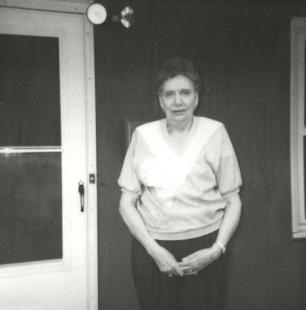Jean M. Knudson
Era: World War II
Military Branch: Army


Jean M. Knudson (nee Painter) of Keewatin, MN entered the Army on Feb. 17, 1944.
She was a registered nurse and was commissioned as a First Lieutenant in the Army Nurse Corps attached to the 32nd Army General Hospital with the Eighth Air Force in England and the 20th Hospital Train in the European Theater.
"I had officer ward duty and then worked with members of the infantry from beaches after D-Day. Our hospital train consisted of converted English mail coaches transported by English ferry boats across Channel to Cherbourg, France. We followed armies up to combat areas and then (brought) the wounded back to the 108th General Hospital in Paris. We lived on the train with four nurses and 30 wounded to a car and one ambulatory car. The assigned enlisted men were very valuable, two to a car to assist. We taught them to draw penicillin by dosage and loaded syringes on trays. They'd hold the tray and nurses would give injections.
"We also did the same with dressings. We went a couple of days or sometimes three without sleep. We wore combat clothes with large pockets. One I filled with narcotics, the other with barbiturates. We could not have handled this task without the able men who were assigned to ward cars.
"We were in the Battle of the Bulge at Liege, Belgium. Extra cars were added to evacuate the wounded as Germans were pushing our troops back. Buzz bombs and rockets made for many anxious moments. One went above our train as we were loading the wounded. The siren blew and everyone ran for shelter. The litter bearers dropped a wounded soldier with a body cast at my feet and ran. Only we four nurses stayed. The soldier with the pleading eyes said: "You won't leave me, will you, lieutenant?" No way I could. I sat on the floor by his litter and talked. I don't remember what I said, not even after the all-clear sounded. The buzz bomb glided away and came down a short distance from us. We felt it but had no damage. Our CO apologized to us four nurses for leaving us. He said he would never worry about nurses in combat again.
"As for VE Day, we used the train to bring German wounded who had been sent to England back to Germany to their hospitals. During the war we also had wounded German POWs. The young Nazi officers tried to make our lives miserable, demanding things by the Geneva Conference rules. They were very arrogant until I made it clear that, as an American officer, I was in command and they were prisoners of war.
"We also had wounded Russian soldiers who were amazed that American women had officer-status and that we were in the war. They only thought American women were as Hollywood depicted. After VJ day our train disbanded. I was assigned to a General Hospital in Nancy, France, until I came back to the States before Christmas, 1945."
In September 1944 Lt. Painter was cited "for meritorious achievement while participating in mending broken bones, hearts and spirits of the men of Ward 59. The sweetness, tirelessness and skill displayed by this officer at all times reflect great credit upon herself and the Armed Forces of the United States." It was signed by 29 doctors and nurses.
Mrs. Knudson was awarded the: European-African-Middle East Campaign Medal with two bronze battle stars, World War II Victory Medal and three overseas service bars.
She was honorablydischarged as First Lieutenant on Jan. 25, 1946 at Fort Des Moines, Iowa.
Source: Hometown Heroes: The St. Louis County World War II Project. 148.

